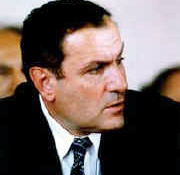I have not mentioned the Karabagh conflict settlement in the previous six sections of the series of articles, although the Armenian authorities of that time were always active in the negotiations process. The opposition was putting forward social and economic issues and sometimes used to their benefit the question of the settlement of the Karabagh conflict.
Ter-Petrosyan saw that his preplanned political system had collapsed. He had two options: either to unite the potential of the victorious soldiers and take hold of a firm and uncompromising position in the Karabagh conflict settlement process and become the king of the political system in ruins, or propose a new pivot on which the system could be reorganized.
Ter-Petrosyan was a politician who had a rather provident and in spite of the predictions of the observers and analysts of the time, he rejected the first option. The predictions became especially convincing after the elected president of Karabagh agreed to become Prime Minister of Armenia in March 1997. But in less than half a year Ter-Petrosyan published his reconciliation plan and said that he could become a hero for that, but wouldn’t do it. With that he denied the predictions of the observers and analysts and it seems that he didn’t propose anything for the reorganization of the political system.
But the “War or Peace?” dilemma was a serious proposal for the reorganization of the political system. The president was clearly saying that in the case of not making compromises for the Karabagh conflict settlement, they would be obligated to do that. It could be assumed that it was necessary to have an organized internal political system with the inclusion of liberalists, national liberalists and nationalists in order to fight against the obligations. It is not by chance that there were already negotiations being led on the reopening of the ARF in 1996-1997. Ter-Petrosyan agreed to license the activities of that political party if the latter checked its relations with the government and forgot about its pretension of being a state within the state.
In this case we would have a rather powerful political system that would be able to resist all the pressures and forces. Armenia would have a liberal force ready to reconcile, a national-liberal power that had been hurt by the injustice during the previous elections and nationalists that had also been hurt by the pressures in the not too distant past. If the internationalists tried to force anything on the government, they had to absolutely take into consideration that Ter-Petrosyan’s alternative was going to be the brutal resistance and that Ter-Petrosyan was going to reach great heights in the negotiations process with the threat of that brutal resistance-something which was not preferable for the opposition because with that they saw the fortification of the government.
That was the reason why instead of grasping the concept of reorganizing the political system, the opposition attacked Ter-Petrosyan and considered him a loser and traitor of national interests.
Ter-Petrosyan had already said that he was not going to unite the victorious soldiers for the sake of power and that he was not going to insist upon his position. The victorious soldiers, who were not familiar with the reconciliation plan, had to figure out where they stood. After the speeches made in 1997, it was clear that Ter-Petrosyan was going to leave and the soldiers would not be able to go with him perhaps because the war was still not over.
The national-liberalists understood that they could no longer have pretensions of coming to power and were thinking about the status of the ruins. The Dashnaks were waiting for their day to come out of prison and have their modest place under the sun. The victorious soldiers were looking for their king of the ruins who would look a little “grazhdanski” (governmental) and be able to conduct negotiations like Karaulov gave interviews.
There is an opinion that after becoming prime minister of Armenia, Kocharyan instigated the strong to get rid of Levon Ter-Petrosyan and open the road for him to come through. I tend to differ. The strong, which is the same as the victorious soldiers, went to the prime minister, knocked on his door and asked him to lead their movement. What’s more, they even guaranteed that they would never go against him if, of course, Kocharyan did not arrive at the conclusion of Ter-Petrosyan’s plans. Kocharyan, in his turn, guaranteed that he wouldn’t do that even if he saw that he would lose Armenia along with Karabagh.
In 1998, Ter-Petrosyan resigned from office and left Armenia in a state of uncertainty and confusion.
To be continued…

